ISO 42383 HMF Quantification in Syrups
The quantification of hydroxy-methylfurfural (HMF) is crucial in food and feed testing, particularly for syrups. HMF is a byproduct of non-enzymatic browning reactions that occur during the processing, storage, or aging of foods containing reducing sugars such as fructose and glucose. High levels of HMF can indicate poor quality control processes, leading to potential safety issues and reduced shelf life.
ISO 42383 provides a standardized method for determining HMF in syrups. This service is essential for ensuring compliance with international standards, maintaining product integrity, and protecting consumer health. Understanding the HMF content helps manufacturers identify potential processing inefficiencies or contamination risks, enabling them to implement corrective measures promptly.
Our laboratory employs advanced analytical techniques such as high-performance liquid chromatography (HPLC) and gas chromatography-mass spectrometry (GC-MS) for precise quantification. These methods offer high accuracy and reliability, ensuring that the results meet stringent industry standards.
The testing process involves several key steps: sample preparation, extraction, derivatization if necessary, and finally, analysis using HPLC or GC-MS. Each step is critical to obtaining accurate quantitative data on HMF levels in syrups. Proper sample handling ensures that the results reflect the true state of the product without introducing errors.
Compliance with ISO 42383 not only enhances the reputation of your brand but also fosters trust among consumers and regulatory bodies. It demonstrates a commitment to quality and safety, which are paramount in today’s competitive market. By offering this service, we contribute significantly to maintaining food safety standards globally.
Our experienced technicians ensure that every test adheres strictly to ISO 42383 guidelines. This includes using certified reagents, calibrated instruments, and standard operating procedures (SOPs). Regular calibration of equipment and validation of methods guarantee consistent and accurate results. Our expertise in handling complex samples allows us to deliver reliable data even when dealing with challenging specimens.
In summary, quantifying HMF in syrups according to ISO 42383 is vital for maintaining product quality and ensuring compliance with international regulations. It helps identify potential issues early on, allowing for timely interventions that can prevent costly recalls or reputational damage. By partnering with our laboratory, you gain access to state-of-the-art facilities and skilled professionals dedicated to delivering accurate, reliable results.
Benefits
- Ensures product quality and shelf life.
- Aids in identifying processing inefficiencies or contamination risks.
- Facilitates timely interventions to prevent costly recalls or reputational damage.
- Demonstrates a commitment to maintaining high food safety standards globally.
Quality and Reliability Assurance
In our laboratory, we place great emphasis on quality assurance. We employ certified personnel who follow standard operating procedures (SOPs) rigorously. Regular calibration of instruments and validation of methods ensure consistent accuracy in all tests conducted.
The use of advanced analytical techniques such as HPLC and GC-MS contributes significantly to the reliability of our results. These tools provide high precision, repeatability, and reproducibility, which are critical for maintaining confidence in our findings.
We also maintain a robust quality management system that complies with international standards. This includes regular internal audits, continuous training for staff, and adherence to best practices across all aspects of our operations.
Environmental and Sustainability Contributions
Incorporating ISO 42383 into food and feed testing has positive environmental impacts by promoting sustainable production practices. By ensuring that syrups meet strict quality standards, we reduce waste and improve resource efficiency throughout the supply chain.
The accurate quantification of HMF helps manufacturers optimize their processes to minimize unnecessary byproducts, thereby contributing to a more sustainable food industry. This aligns with broader sustainability goals aimed at reducing environmental footprints globally.
Frequently Asked Questions
- Ensures product quality and shelf life.
- Aids in identifying processing inefficiencies or contamination risks.
- Facilitates timely interventions to prevent costly recalls or reputational damage.
- Demonstrates a commitment to maintaining high food safety standards globally.





